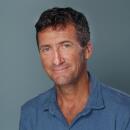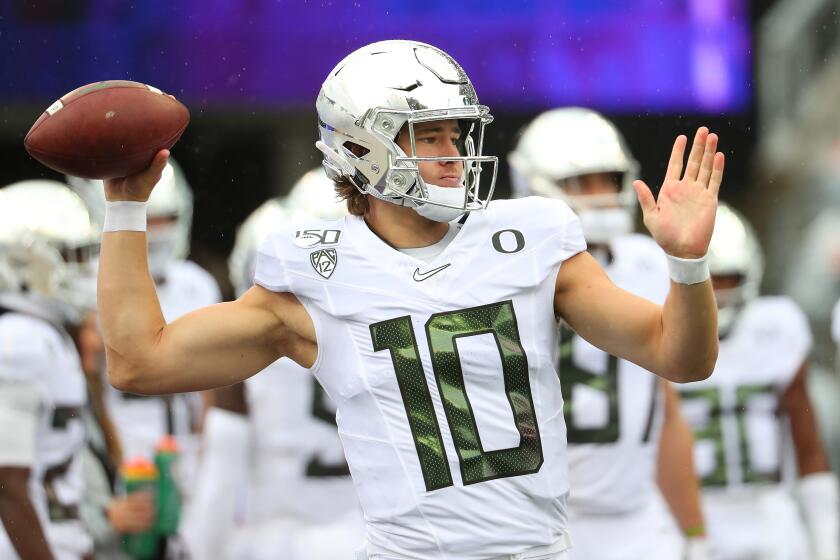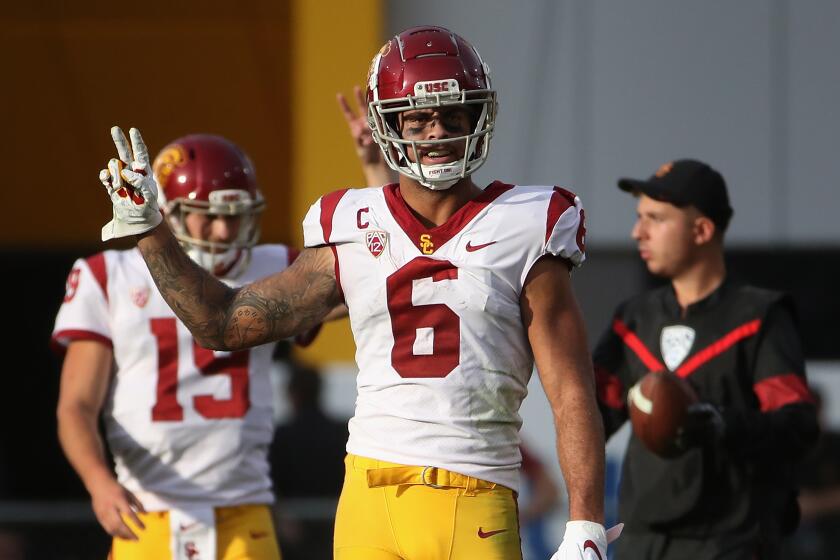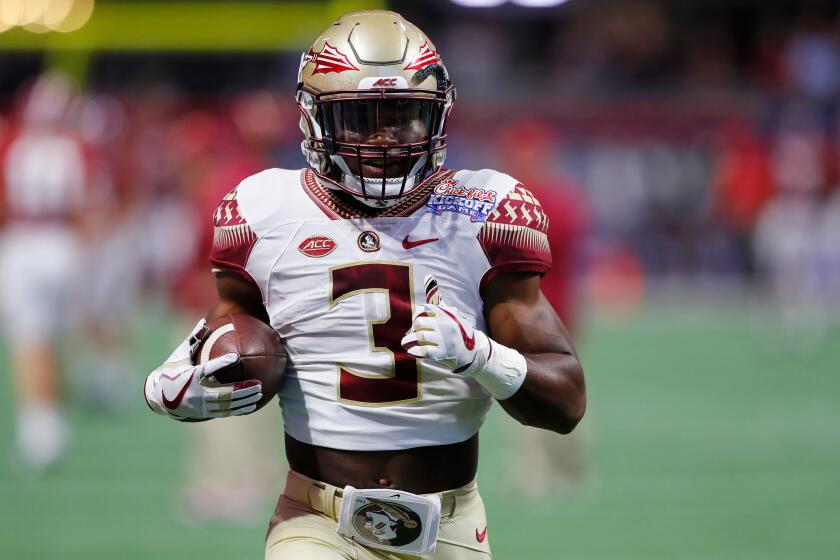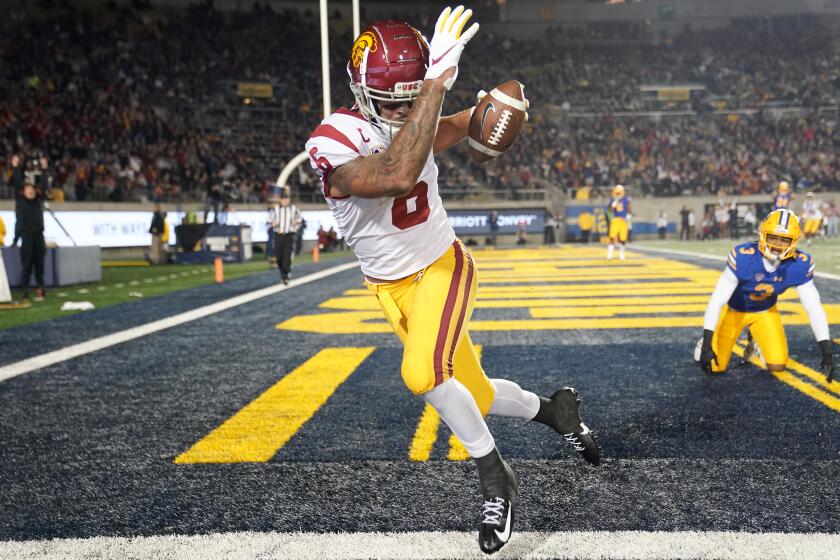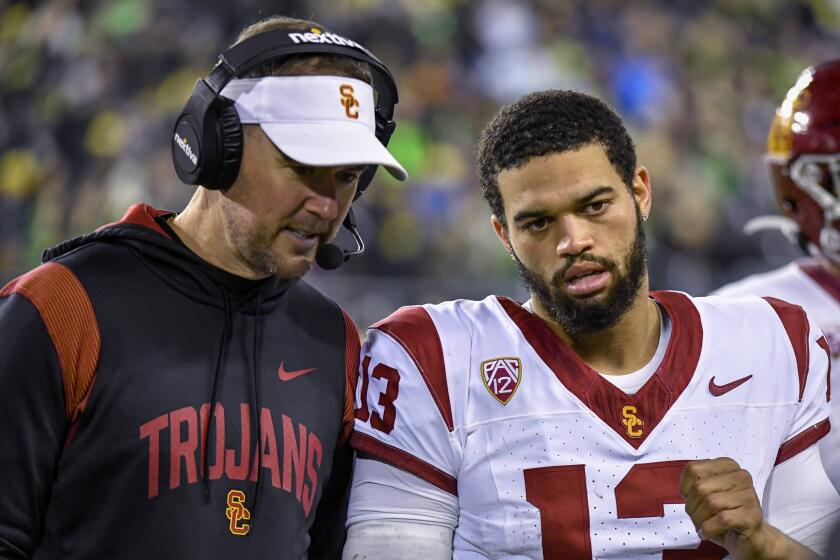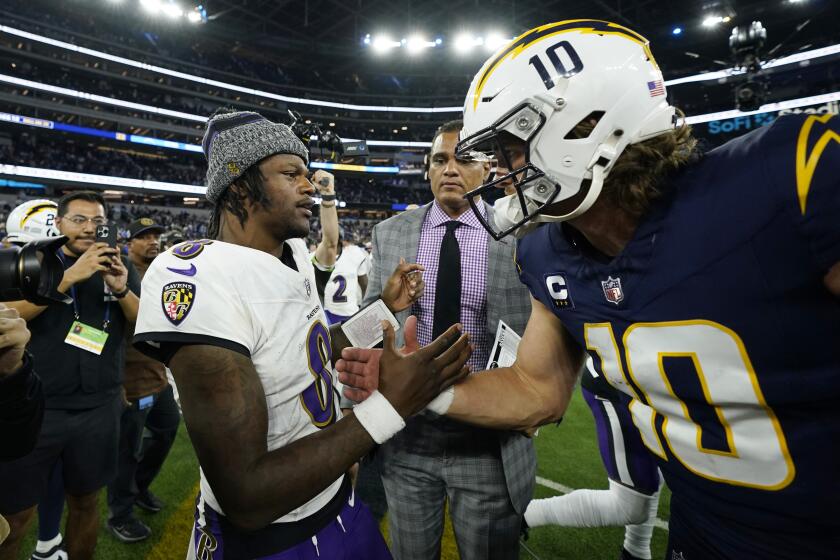Justin Herbert’s journey from Oregon to NFL has SoCal roots
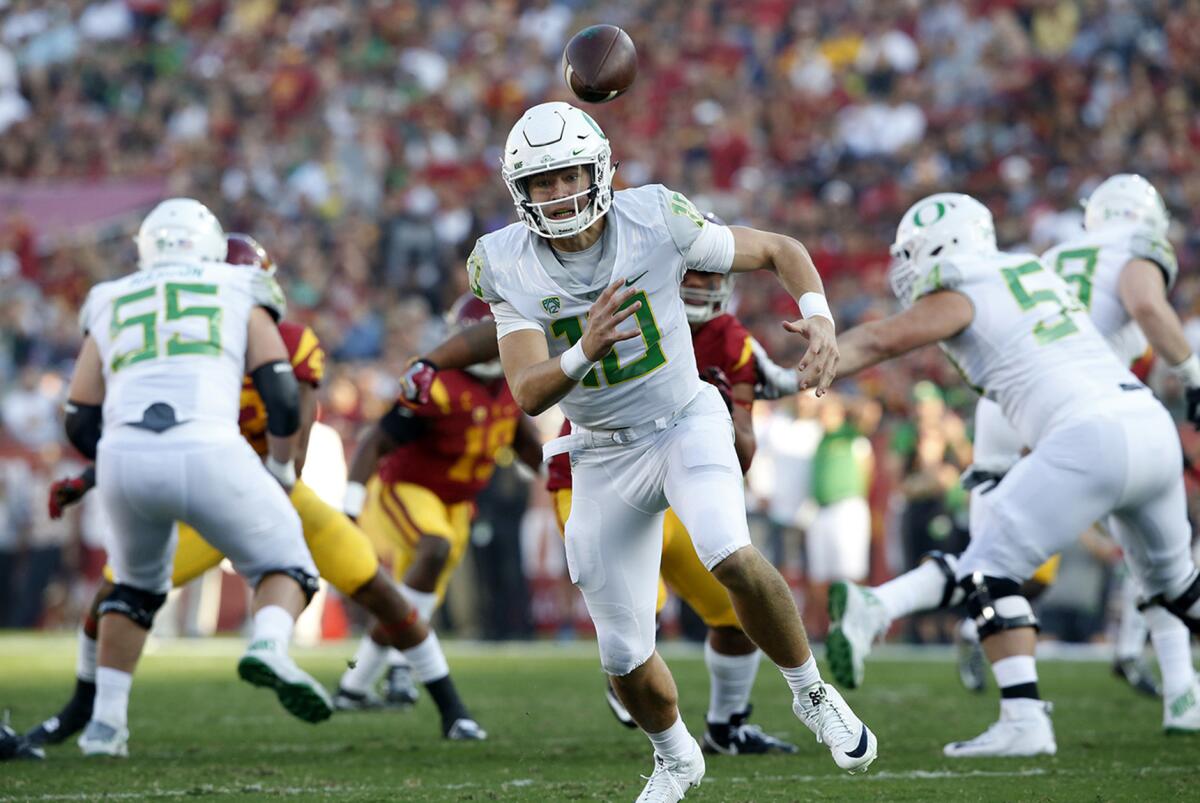
With the sixth pick in the 2020 NFL draft, the Chargers selected Justin Herbert.
Or was he the one who selected them?
“This is the greatest thing that could have happened,” Herbert’s father, Mark, said. “It’s perfect for Justin. I don’t know that I’ve ever seen him as excited, as focused, as ready as he is now. We couldn’t have handpicked anything better.”
Shortly after the Chargers drafted the former Oregon standout Thursday, a photo surfaced on the internet of Herbert as a child wearing a Chargers T-shirt. That’s just the beginning.
Growing up in Eugene, Ore., where there is no NFL team, Justin and brothers Mitchell and Patrick were Chargers fans. Each had a jersey. There was a David Boston, a Drew Brees and a LaDainian Tomlinson.
There are family roots in Southern California, one grandfather being from San Diego and the other from Fullerton. One set of great-grandparents was from Orange County.
Justin Herbert is going from small town to big time in L.A. But to last, he and the Chargers are going to need to win, which is one thing he happens to be good at.
The family has vacationed here plenty and visited more often.
“Justin would go to the moon to play,” Mark said. “He didn’t care. But, if you did have a say, this just made so much sense.”
After a pause, the father added: “I don’t want this to be corny. But, you know, the story does sound kind of corny.”
That’s just how things are today for this newest Charger, a small-town kid and multi-sport prep star who grew up close enough to Autzen Stadium to practically hear the roars and eventually caused those roars himself as Oregon’s quarterback.
Being drafted into the NFL might be as big a dream as playing in the league, the made-for-television production poignantly capturing the Herbert family and all their emotions when the Chargers — their Chargers — called.
It was a very real version of fantasy football.
“I’m just so happy for the family,” said Lane Johnson, Herbert’s high school football coach. “I’m telling you, this Herbert family is off the charts. They’re as humble and kind as you can get.”
Sheldon High was where Herbert, in the months leading up to his senior season, began to emerge as a quarterback.
He already had been an ace pitcher on the state-title-winning baseball team and soon enough would be averaging a double-double on the basketball court.
But his football prowess had been delayed, especially after Herbert broke his leg early in his junior season.
He had the talent and the arm, Herbert whistling passes with the sort of zip that, later in college, would result in teammates complaining about their palms smarting.
But it wasn’t until after the broken leg, after a few months without football, that Herbert began to realize what he really wanted.
Johnson, a math teacher at the time, remembers Herbert coming to his room regularly to share disappointments he was feeling.
“It was still really emotional for him,” Johnson said. “He felt like — and this is typical Justin Herbert — he let the team down when he got hurt. I told him, ‘Justin, you got hurt. You didn’t get kicked off the team for smoking dope.’
“I think he just needed to grow up a little bit and he certainly did. He used to tell me, ‘Coach, I like those other sports, but I love football.’ That was a big factor, him being injured and the game being taken away from him.”
Herbert’s only scholarship offer was from Nevada before Oregon became interested. One day in October of his senior season, the Ducks offered and Herbert committed that night.
There was no place he wanted to go other than Oregon, where Herbert’s grandfather Rich Schwab had played.
As kids, he and his brothers discovered the Ducks from Section 12 of Autzen Stadium, Rows 32 and 33 — the location of Schwab’s four season tickets.
USC wide receiver Michael Pittman Jr. was selected by the Indianapolis Colts with the second pick of the second round in the NFL draft.
But when he arrived on campus as a Duck, Herbert was buried on the depth chart. Wanting to play his senior baseball season at Sheldon, he wasn’t an early enrollee.
But he hardly was unprepared for the chance. Despite his limited time around the football program, Herbert’s grasp of the playbook was so thorough that he was able to take over as starter midway through his freshman season.
This is a student-athlete who, while earning his degree, was a three-time Academic All-America first teamer and received A’s in every class but one. Without football, Herbert probably would be bound for medical school.
He is an admitted perfectionist, Oregon coach Mario Cristobal calling Herbert “a detailed machine.” His handwriting is said to be strikingly precise. Cristobal joked that Herbert’s note-taking appears to be “laser printed.”
But, in his first shot as a college quarterback, he and the Ducks fell woefully short of perfection, going 4-8 and hearing boos in their home stadium.
“It wasn’t the Oregon football I was used to,” Herbert said, before noting that he went through three head coaches and three offenses with the Ducks. “We fought through and dealt with adversity.”
The Rams took Florida State running back Cam Akers and Florida wideout Van Jefferson in the second round of the NFL draft among four picks Friday.
By his senior season, Oregon was going 12-2 and winning the Pac-12 and the Rose Bowl, a championship secured when Herbert overcame a so-so passing day to rush for three touchdowns and earn MVP honors.
Throughout his time at Oregon, he even managed to answer doubts about his leadership ability, doubts that resurfaced again during the pre-draft process and continue as a discussion point.
This despite Herbert winning the William V. Campbell Trophy — which recognizes academic success, football performance and exemplary leadership — in December.
Willie Taggart, Herbert’s second coach at Oregon, was among those who publicly prodded him to become a more obvious, more vocal leader. One of his closest friends among the Ducks, center Jake Hanson, once called Herbert “the shiest dude I’ve ever met.”
As for the Chargers, general manager Tom Telesco expressed zero concerns about Herbert’s leadership, instead praising the resolve he routinely displayed in leading Oregon back from 4-8 and the Autzen boos.
“No matter what your personality is, you can lead,” Telesco said. “We’ve seen him lead. I’ve seen him lead on the field with my own eyes. Our scouts have seen him lead.”
Michael Pittman Jr. (Indianapolis), Antoine Winfield Jr. (Tampa Bay) and Van Jefferson (Rams) all made their first steps down a path their dads took.
So, when will Herbert have a chance to lead the Chargers? Veteran Tyrod Taylor is the projected Week 1 starter for 2020, with Herbert expected to be groomed as his eventual replacement and possible long-term franchise quarterback.
In the meantime, this somewhat corny sounding story will be allowed to continue. Because of the COVID-19 restrictions, all five Herberts shared Justin’s selection together at the family’s home in Eugene.
There was no trip to Las Vegas, no loud NFL-sponsored draft party right off the Strip. There was only a quarterback with his parents and two brothers, watching his dream unfold in the most vivid colors possible.
When Herbert’s phone buzzed Thursday, he glanced down to notice Telesco’s name. One brother, Mitchell, grabbed his arm as his father noticed the caller ID too.
“You go back to getting married, having three boys … wow, this might be right up there,” Mark said. “Winning a Rose Bowl is awesome. Pac-12 championships and state champions, those are great. But this is something else.
“This is an incredible situation, and it’s not lost on us or him. I’m just so excited for him because of this opportunity. Hope and opportunity, if you’ve got those, you’re going to be OK.”
Staff writer Andrew Greif contributed to this report.
More to Read
Go beyond the scoreboard
Get the latest on L.A.'s teams in the daily Sports Report newsletter.
You may occasionally receive promotional content from the Los Angeles Times.
